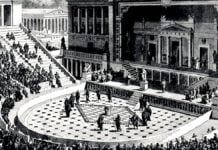Ayyankali (1863–1941) was one of the most influential social reformers in modern Kerala, fighting against caste-based discrimination through direct political action rather than religious reform. He was unique among his contemporaries because he challenged the rigid caste system without assuming the spiritual or saintly persona that characterised other reformers of his time.
He was influenced by the reformist teachings of Ayya Vaikundar and Thycaud Ayyavu, and was a contemporary of Chattampi Swamikal and Sree Narayana Guru, whose movements he closely observed. Born in Venganoor, Thiruvananthapuram, on 28 August 1863, Ayyankali belonged to the Pulaya community, one of the most oppressed groups in Kerala’s caste hierarchy. His family, however, was relatively better off since they had five acres of land granted by their landlord.
Despite this, the Pulayas in general lived as bonded labourers (adiyans) working under janmis (landlords). Ayyan, as he was affectionately known, gradually rose to become the Urpillai or Moothapillar—the village head—among his people, representing their grievances and leading them in collective resistance.

The Struggle Against Caste Oppression
Ayyankali’s early activism emerged from the slavery-like conditions faced by his community. The Pulayas were denied fundamental human rights: they could not walk on public roads, cover their upper bodies, or enter market areas. In response, Ayyankali organised groups of Pulaya men to resist these humiliations.
The defining moment in his activism came in 1893, when he rode a bullock cart (Villuvandi) along a road reserved for upper castes, dressed like a landlord with a headgear and upper cloth. This bold act, known as the Villuvandi Samaram (Bullock Cart Revolt), symbolised defiance and self-respect, directly confronting caste taboos in Travancore society.
Following this, Ayyankali encouraged his community members to enter markets, walk on public roads, and claim their right to mobility. These actions often led to violent clashes between upper-caste groups and the Pulayas. Yet, through repeated struggles such as the Chaliyar Riots, the Pulayas gradually secured the right to use public roads, though temple roads remained restricted.
Educational Reform and the Right to Learn
Ayyankali understood that education was the key to social liberation. He urged his people to pursue learning as a path toward independence and dignity. During this period, a few Pulayas had access to schools run by missionary organisations such as the London Missionary Society (LMS). Ayyankali demanded that the government extend modern education to all lower-caste communities as part of its social reform agenda.
In 1904, he established the Sadhu Jana Paripalana Sangham (SJPS)—a collective dedicated to the protection, education, and empowerment of oppressed castes. The SJPS soon became a significant platform for social mobilisation among the lower castes in Travancore.
When a Pulaya girl’s admission to a government school in Ooruttambalam was violently opposed and upper-caste men burned down the school itself, Ayyankali responded with a historic agricultural strike. He called upon the Pulaya labourers to boycott work in upper-caste paddy fields until caste restrictions in education were abolished. This was one of the earliest organised labour strikes in Indian history, linking education, labour, and social justice.
Political Leadership and Representation
Ayyankali’s influence grew steadily, and in 1910, he became a member of the Sree Moolam Popular Assembly, the legislative council of Travancore. He used this position to advocate for the rights of the Pulayas and other oppressed castes, pressing for legal and educational reforms.
He recognised that the agricultural economy of Travancore depended on Pulaya labour, and that the withdrawal of this labour could be used as a political weapon. His leadership thus transformed the struggle of an enslaved community into an organised political movement, laying the foundation for Kerala’s later democratic and socialist movements.
Advocacy for Women and Cultural Reform
Ayyankali also championed women’s rights among the oppressed castes. He supported the Maru Marakkal Samaram, a movement that sought to give women from the untouchable castes the right to wear upper cloths, similar to the earlier struggle won by Nadar women under Ayya Vaikundar.
He organised mass gatherings, cultural festivals, and meetings to unite the community—especially women—through social and political awareness rather than religious devotion. His Sadhu Jana Paripalana Sangham also served as a cultural forum where singing, dancing, and community celebrations became instruments of solidarity and empowerment.
In 1937, during Mahatma Gandhi’s visit to Kerala, Ayyankali’s reform work received national recognition. Gandhi publicly praised Ayyankali for his relentless efforts in uplifting the untouchable castes, especially following the Temple Entry Proclamation of Travancore, which marked a milestone in Kerala’s social reform history.
Ayyankali’s Contribution to Knowledge and Politics
Ayyankali’s contribution to Kerala’s intellectual and political history lies in his politics of militancy and direct action. He was one of the first leaders to see the struggle of the oppressed not merely as a social issue but as an economic and political problem. He recognised that the upper-caste dominance rested on control over labour and that the withdrawal of this labour could destabilise their power.
His two most significant contributions were:
- The strategy of organised resistance and collective bargaining through strikes, protests, and physical defiance.
- The spread of education and political awareness among the lower castes through social organisations and cultural mobilisation, rather than religion.
Ayyankali demonstrated that actual social change required education, unity, and political courage. His approach combined class consciousness with social justice, making him one of Kerala’s earliest champions of equality and labour rights.
Ayyankali’s militancy represents a turning point in Kerala’s modern history. He transformed the struggle of a marginalised community into a revolutionary movement for dignity, education, and equality. His actions broke the silence of centuries of oppression and inspired future generations to see resistance as a legitimate form of political knowledge.
Through his defiant marches, his commitment to education, and his mobilisation of the Pulayas into a collective force, Ayyankali not only challenged the caste system but also redefined the idea of social reform in Kerala—from religious reform to political emancipation. His life continues to symbolise courage, equality, and the power of organised resistance.
- Ayyankali (1863–1941) was a Pulaya leader who led militant social reform in caste-ridden Kerala.
- He launched the Villuvandi Samaram (1893), symbolising defiance against caste restrictions.
- He founded the Sadhu Jana Paripalana Sangham (SJPS) for the uplift of oppressed castes.
- He organised a historic agricultural strike demanding educational rights.
- Represented oppressed castes in the Sree Moolam Popular Assembly (1910).
- Advocated for women’s rights through the Maru Marakkal Samaram.
- Promoted education, self-respect, and political unity over religious reform.
- His strategy of direct action and labour resistance laid the foundation for Kerala’s later democratic movements.
- Mahatma Gandhi praised his work during his visit to Kerala in 1937.
- Ayyankali remains a symbol of resistance, social justice, and empowerment in Kerala’s history.




























